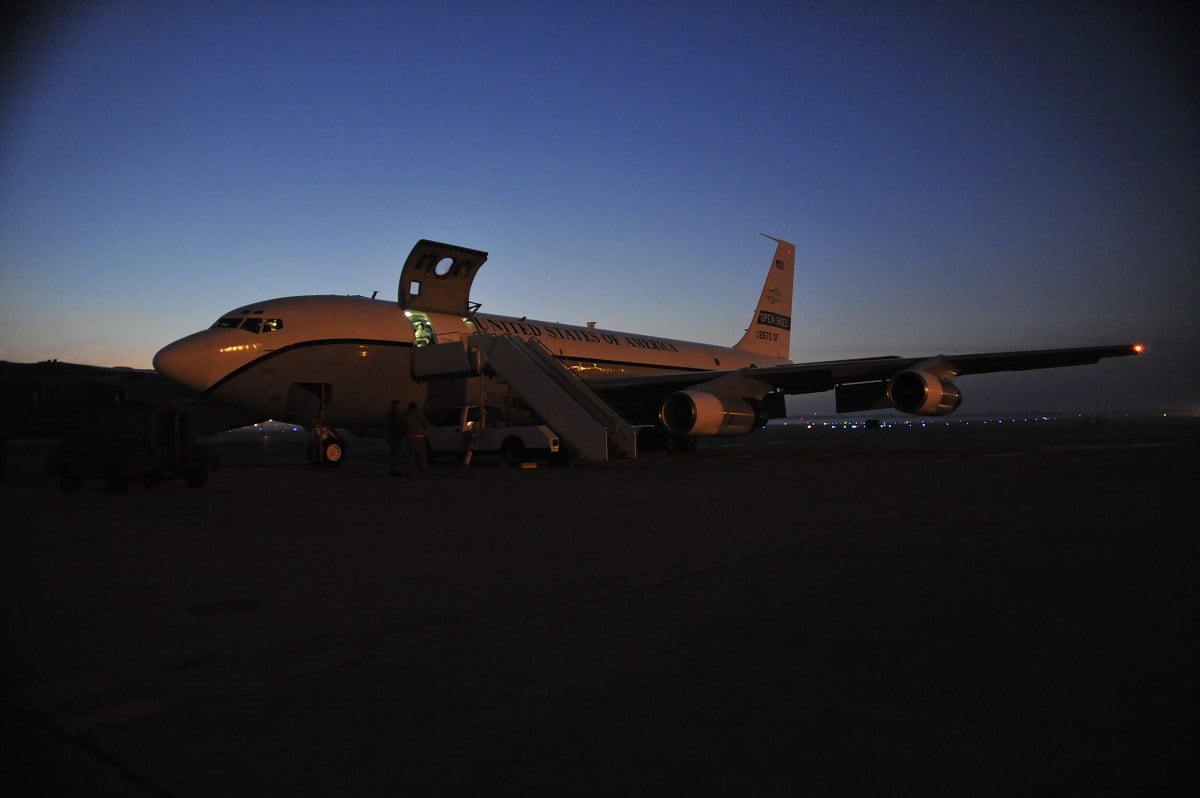WASHINGTON — The United States appears unlikely to rejoin the 34-nation Open Skies Treaty over its concerns about Russian noncompliance, with the Biden administration telling international partners in a recent diplomatic memo obtained by Defense News that doing so would send the “wrong message” to Russia.
The note, sent days before the U.S. Air Force confirmed plans to retire the aging aircraft used to fulfill the mutual surveillance pact, may signal the end of hopes that the U.S. will rejoin the agreement.
Though President Joe Biden, as president-elect, condemned then-President Donald Trump’s decision last year to withdraw from the treaty, Russia has since pulled out, and the Senate’s 50-50 split presents an uphill fight to re-ratify the agreement.
The State Department said in a statement Monday that a final decision has not been made. However, in a March 31 demarche, it told multiple partners that the administration is “frankly concerned that agreeing to rejoin a treaty that Russia continues to violate would send the wrong message to Russia and undermine our position on the broader arms control agenda.”
Other countries signed onto the Open Skies Treaty, including prominent NATO allies, pushed for the U.S. to remain as a participant, arguing the pact serves as a valuable channel for transparency and dialogue between Russia and the United States, the world’s top two nuclear powers. The letter acknowledged the issue came up at a Feb. 25 NATO event, as well as in private conversations.
RELATED

“While we recognize that Russia’s Open Skies violations are not of the same magnitude as its material breach of the INF Treaty, they are part of a pattern of Russian disregard for international commitments — in arms control and beyond — that raises questions about Russia’s readiness to participate cooperatively in a confidence-building regime,” the demarche read, referring to the Intermediate-Range Nuclear Forces Treaty.
The Biden administration did not spell out its noncompliance concerns in the letter, but the Trump administration quarreled with Moscow over what cameras were being equipped on Russian overflights; it also accused Russia of restricting flights over Kaliningrad and using Open Skies to surveil the Trump golf resort in Bedminster, New Jersey, something open-source experts have questioned.
The diplomatic message doesn’t entirely rule out a return, saying: “We believe, however, that there are circumstances in which we return to OST or include some of OST’s confidence-building measures under other cooperative security efforts.”
Still, it’s a sharp turn from November, when Biden condemned the withdrawal, warning it would “exacerbate growing tensions between the West and Russia, and increase the risks of miscalculation and conflict.” (Biden has signaled a harder line with Russia than Trump, agreeing with a news anchor’s question last month that Russian President Vladimir Putin is a “killer.”)
Asked about the diplomatic note, a State Department spokesman said that “no decision has been made on the future of U.S. participation in the Open Skies Treaty.”
“The United States is actively reviewing matters related to the treaty and consulting with our allies and partners. Russia’s continuing noncompliance with the Treaty is one of several pertinent factors,” the spokesman said. “As this process continues, we encourage Russia to take steps to come back into compliance with the agreement.”
While the demarche likely did nothing to convince OST members that the U.S. will rejoin the agreement, two of the treaty’s staunchest allies in Congress see the retirement of the aircraft used to fly Open Skies missions as a sure sign that Biden isn’t rejoining. Treaty advocates were hopeful in November — when the Trump administration declared it was exiting Open Skies but didn’t retire the aircraft — that the Biden team could still revive the pact.
But just days after the March 31 note to allies, the Omaha World-Herald broke news that the two 1960s-era OC-135B aircraft used to fly aerial photography missions under the treaty will be retired from the 55th Wing at Offutt Air Force Base, Nebraska, and flown to the Air Force’s desert “boneyard” in Arizona in May and June.
“Since there is no longer a mission requirement for OC-135B, the Department of the Air Force has moved to initiate standard equipment disposition actions in accordance with regulations,” an Air Force spokesperson said in a statement to Defense News. “Part of that disposition includes moving the aircraft to the 309th Aerospace Maintenance and Regeneration Group at Davis Monthan Air Force Base, Arizona, in the next couple of months.”
Republican Rep. Don Bacon, a retired Air Force one-star general who commanded the 55th Wing at Offutt and now represents an adjacent area, said he learned of the move last week from a congressionally mandated report from acting Air Force Secretary John Roth. Afterward, Bacon seemed resigned that the fight to save the OC-135Bs is lost.
“I think the door’s about 95 percent shut” on the Open Skies Treaty, Bacon told Defense News. “My impression from reading this document is that the Biden administration has made the decision not to revive Open Skies. They didn’t use those exact words, but they treated it matter-of-factly that it’s done.”
Bacon did not rule out a future push to acquire Gulfstream aircraft to fulfill the mission. However, the 20-page report said the Air Force determined it would be too costly to keep flying the OC-135Bs and that there is no other mission for them; they will be used for parts.
Another key advocate for Offutt, Sen. Deb Fischer, R-Neb., indicated to Defense News that she is ready to move on.
“Russia’s failure to obey the parameters of the Open Skies Treaty was the key reason why the U.S. withdrew, a decision that the Biden administration has not disputed,” Fischer said in a statement. “Rather than invest more in two aircraft that were already slated for retirement, I am focused on the positive future of Offutt’s growing missions.”
Valerie Insinna in Washington contributed to this report.
Joe Gould was the senior Pentagon reporter for Defense News, covering the intersection of national security policy, politics and the defense industry. He had previously served as Congress reporter.
Aaron Mehta was deputy editor and senior Pentagon correspondent for Defense News, covering policy, strategy and acquisition at the highest levels of the Defense Department and its international partners.








